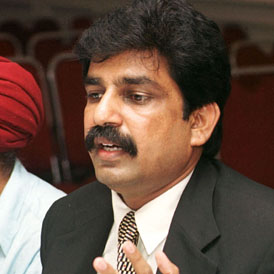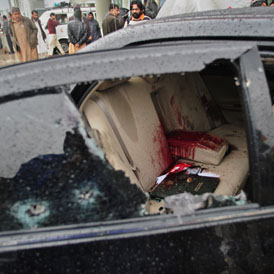Militants assassinate Pakistan’s minority minister
The Taliban claims responsibility for killing the Cabinet’s only Christian Minister Shahbaz Bhatti. An Islamic expert tells Channel 4 News he’s “deeply distressed” at the situation in the country.

42 year old Mr Bhatti, the Minister for Religious Minorities, is the second top official killed this year for opposing a controversial blasphemy law.
He had just left home on his way to work in a residential area of Islamabad when three gunmen surrounded his car and sprayed it with at least 25 bullets. Eyewitnesses and police said the gunmen dragged Mr Bhatti out of his car and shot him several times before escaping in a white Suzuki.
Mr Bhatti was taken to the nearby Shifa Hospital but was pronounced dead on arrival. He had been shot eight times and his driver was also seriously injured.
Earlier, Pakistani TV channels showed pamphlets at the scene of the killing that were attributed to the Pakistani Taliban warning of the same fate for anyone opposing the blasphemy law.
One of the world’s leading Islamic scholars – the Oxford Univeristy professor Tariq Ramadan- told Channel 4 News he was “deeply distressed and worried” at the situation in Pakistan.
“This is not the way of Islam, it is crazy, it is mad.” Professor Tariq Ramadan
“This is not the way of Islam, it is crazy, it is mad, and it is a case where religion has been politicised by leaders in the country ,” he said. “The religious leaders in the country need to condemn these actions in the most vociferous of manners .”
“Whereas the people of North Africa and the Middle East are rising up for freedom, there seems to be a very worrying state of affairs in Pakistan. This is a descent into madness.”
Mr Bhatti – who headed the All Pakistan Minorities Alliance – had previously requested extra security after receiving a number of death threats after he vowed to reform the blasphemy law. Shots had also been fired at his house in Islamabad by unknown assailants.
Police Chief Wajid Durrani insisted that the Minister had been provided with proper security but said he was not accompanied by his security detail when the attack happened. Security has now been stepped up on all main roads in Islamabad
Prime Minister Yousuf Raza Gilani visited the hospital and offered condolences to Mr Bhatti’s grieving relatives. “Such acts will not deter the government’s resolve to fight terrorism and extremism,” he said, adding that the killers would not go unpunished.”
A spokesman for President Asif Ali Zardari expressed similar sentiments. “This is a concerted campaign to slaughter every liberal, progressive and humanist voice in Pakistan,” he said.
In London, Prime Minister David Cameron said “it shows what a huge problem we have in our world with intolerance. I will send not only our condolences but our clearest possible message to the government and people of Pakistan that this is simply unacceptable”, he added.

The Foreign Secretary, William Hague, called it “a cowardly attack on a democratically elected Government Minister and an attempt by extremists to silence free speech and debate in one of the world’s largest democracies”.
“Mr Bhatti’s death is a tragic loss for Pakistan and for all people who believe in human rights and freedom of speech,” he added.
The Vatican called the murder of the politician “unspeakable” and said it was worried for Pakistan’s estimated five million Christians. Meanwhile the two most senior figures in the Church of England, the Archbishop of Canterbury Rowan Williams and the Archbishop of York John Sentamu, called on Pakistan’s government to protect minorities.
“This further instance of sectarian bigotry and violence will increase anxiety worldwide about the security of Christians and other religious minorities in Pakistan, and we urge that the government of Pakistan will do all in its power to bring to justice those guilty of such crimes and to give adequate protection to minorities,” they said.
Mr Bhatti had been a vocal opponent of the controversial blasphemy law along with the liberal governor of Punjab province, Salman Taseer, who was shot by his own bodyguard in January.
The governor had backed a private member’s bill in parliament by Sherry Rehman to amend the blasphemy law in an attempt to make miscarriages of justice less likely and remove its death penalty.
Death threats
After Mr Taseer’s assassination, Bhatti said he was also receiving death threats, telling reporters that he was “the highest target right now”. But he had insisted that he would not be intimidated. “I cannot trust on security…. I believe that protection can come only from heaven, so these bodyguards can’t save you.” Mr Bhatti said at the time.
Pakistan’s law against blaspheming Islam carries the death penalty. While no one has ever been executed, thirty people who’ve been accused have been lynched by mobs. Ten blasphemy cases were reportedly heard in court in the 58 years between 1927 and 1985, but since then more than 4,000 cases have been handled.
The law has been in the spotlight since November when Christian mother of five Aasia Bibi was sentenced to hang for making derogatory remarks about the Prophet Mohammed. Bibi was set upon by a mob, arrested by police and sentenced on November 8.
Politicians and conservative clerics have fiercely debated whether Bibi should be pardoned. But following Taseer’s death, the government has made it clear it does not support reform of the blasphemy law.
Critics of the blasphemy law say it is being abused to persecute minorities during personal disputes. Before his death Mr Bhatti had worked to form inter-faith projects to try and resolve disagreements.